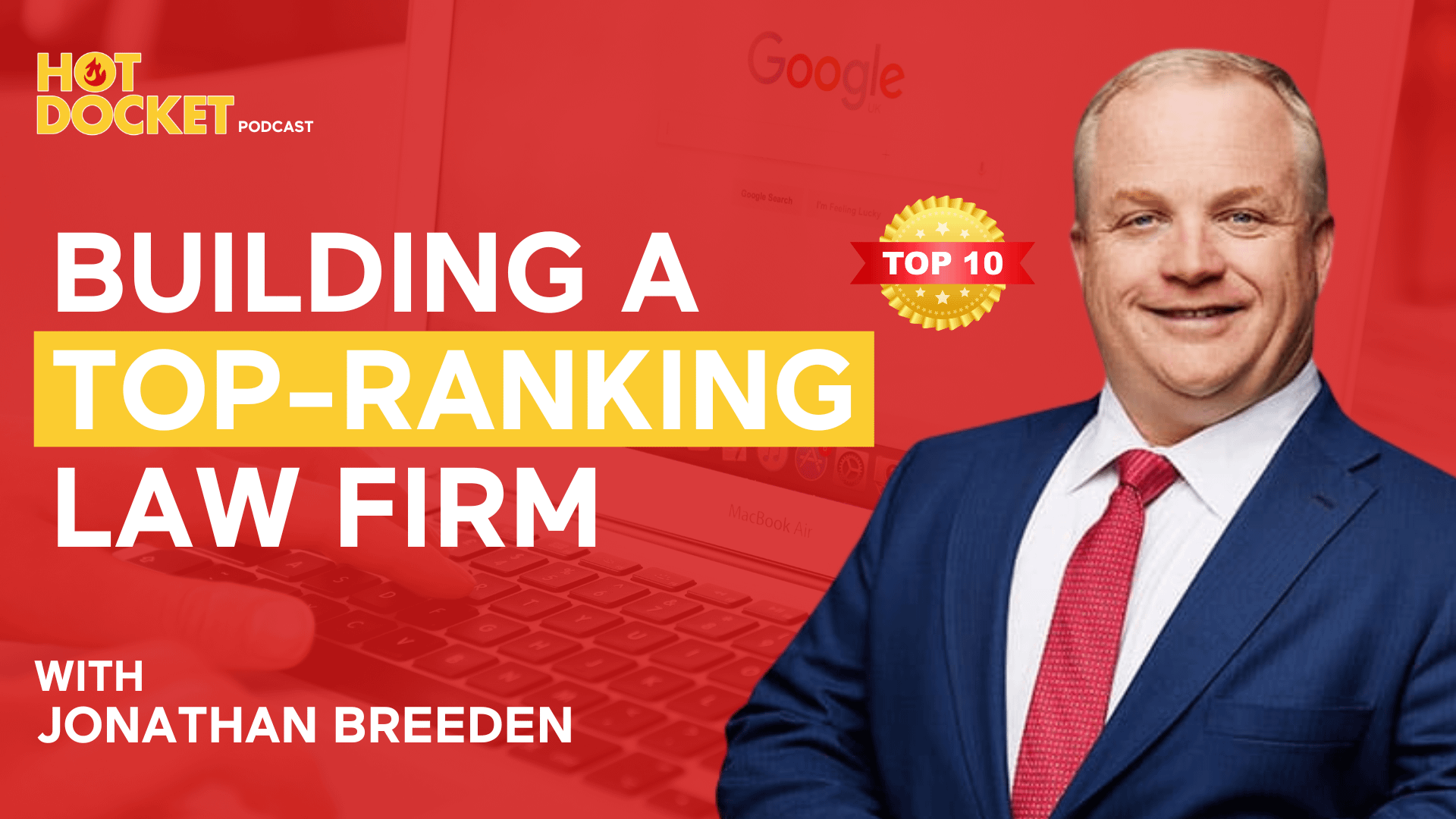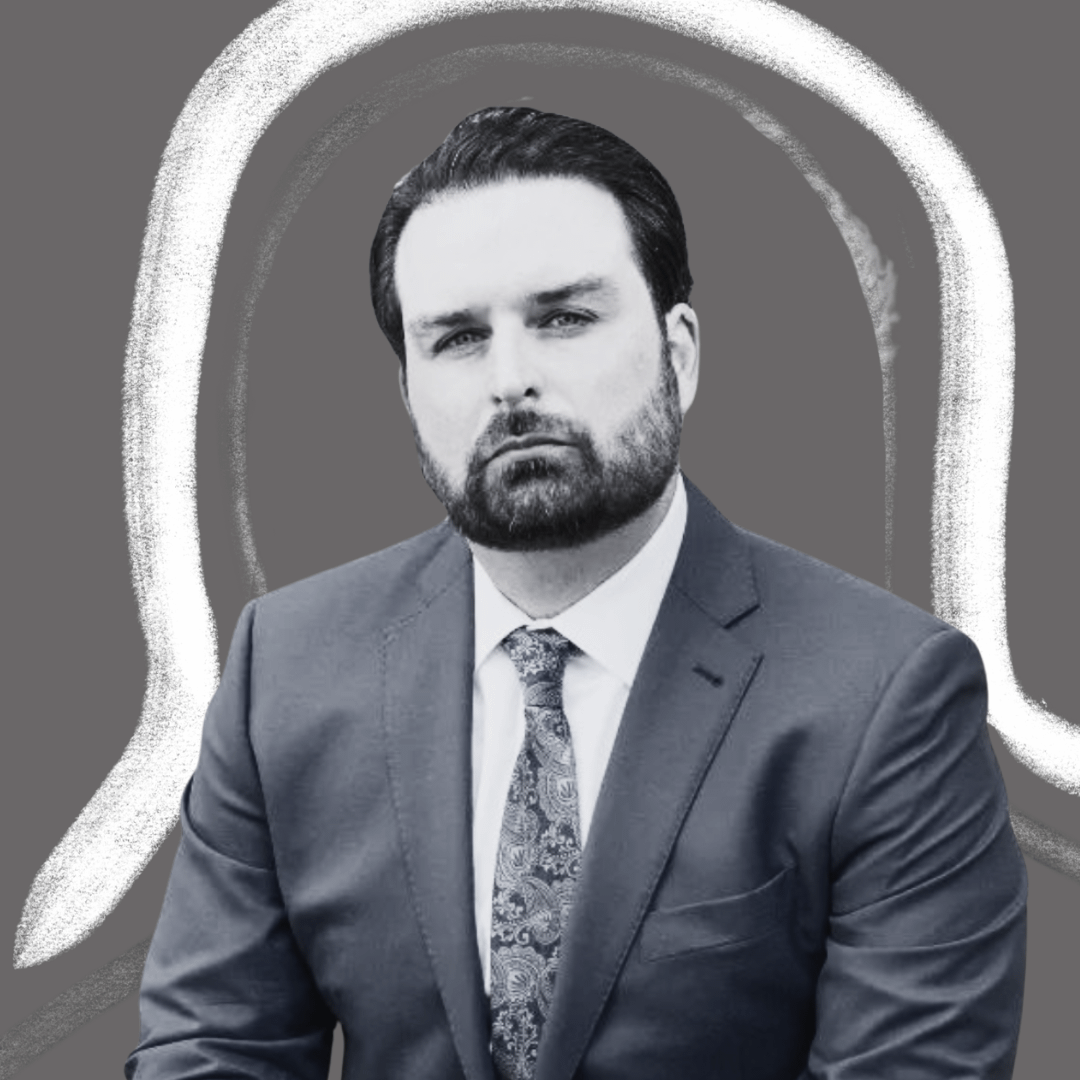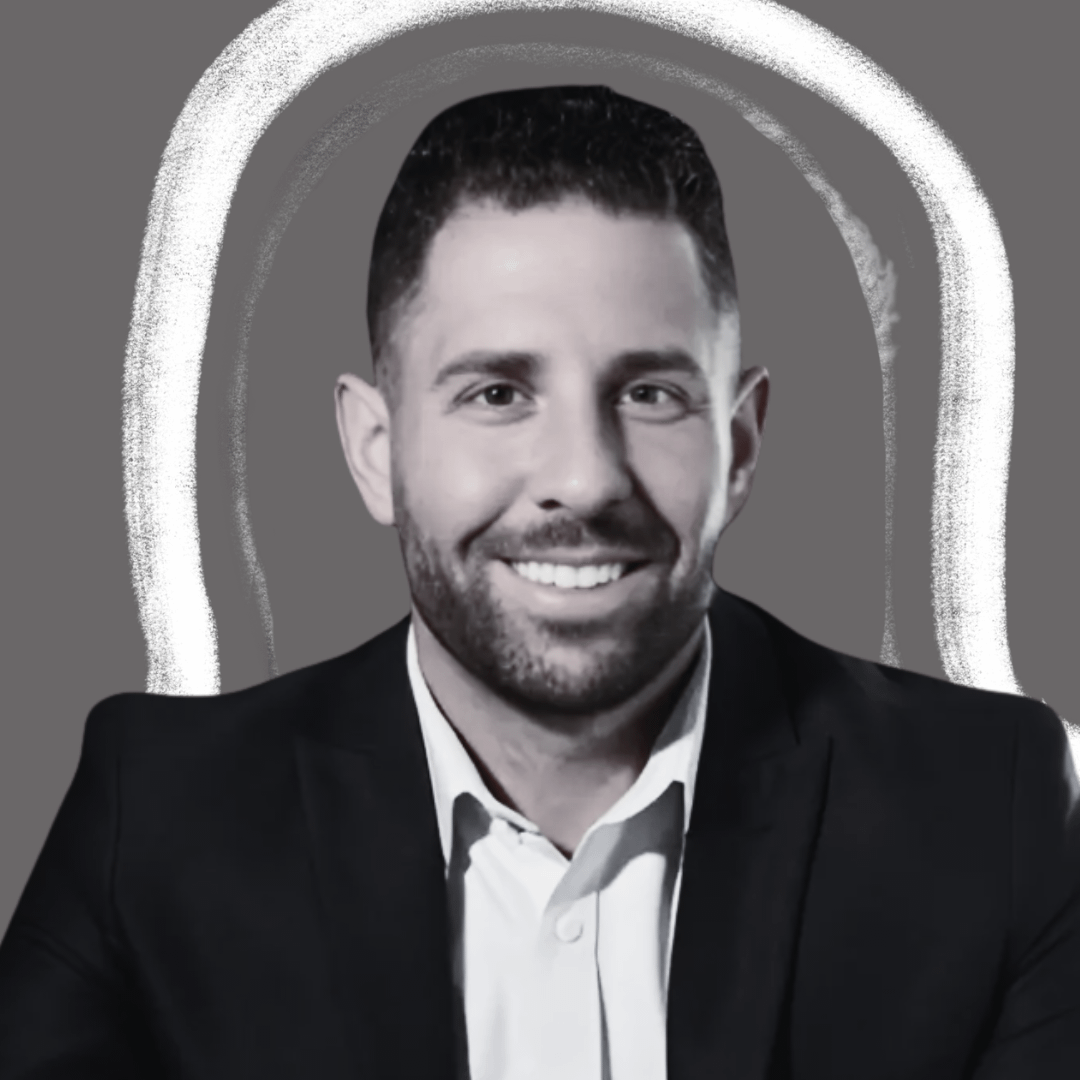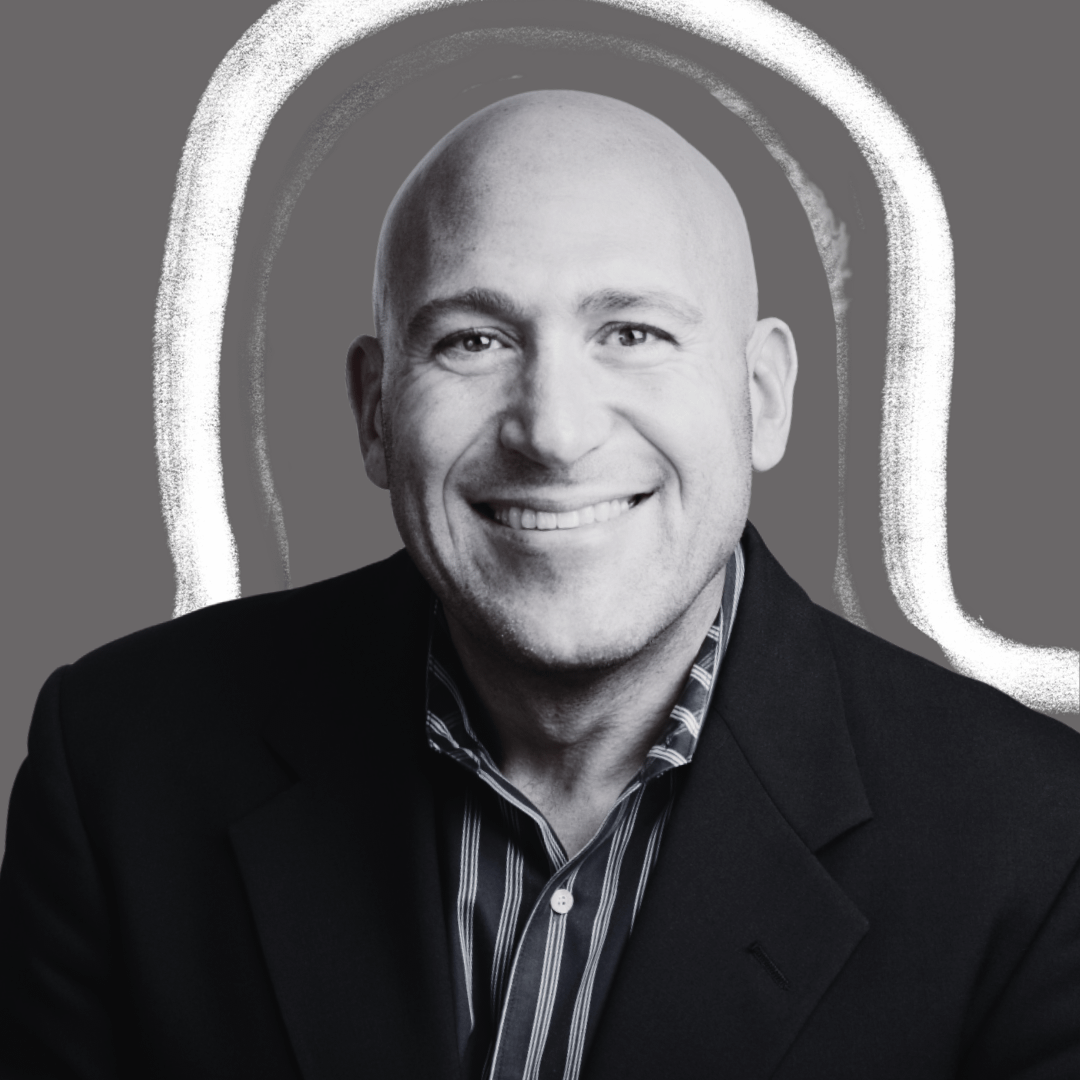
Episode Overview
Are you a solo attorney looking to scale your practice and stand out in a competitive legal market? In this episode of Hot Docket, we sit down with Jonathan Breeden, Owner and Attorney at Breeden Law Office, to explore how he transformed his solo practice into one of North Carolina’s leading family law firms.
As law firms across the country turn to digital marketing and tech-driven solutions, Jonathan shares what it really takes to stay ahead—especially in saturated urban and suburban markets.
🔍 Sneak Peek: After partnering with a boutique marketing agency, Jonathan’s firm website climbed into the top 10 law firm websites in North Carolina within just 18 months—a testament to the power of smart strategy and strong online presence.
https://hot-docket-podcast-biweekly-bites-of-law-firm-marketing-by.simplecast.com/episodes/solo-lawyer-to-industry-leader-the-journey-of-building-a-top-10-firm-jonathan-breeden
Episode Links
Want to hear more from elite lawyers and industry-leading marketers?
Follow us on Social Media for more
Episode Topics
- Invest in a professional, consumer-tailored website for better lead management.
- Seek out marketing firms that understand your market and can personalize your strategy.
- Consider the practical application of law in your education and ongoing practice.
- Balance aggression and amicability in family law to align with client needs.
- Get a business coach to help grow and scale your law firm effectively.
Episode Transcript
[00:00:00] Jonathan Breeden:
If you’re going to grow, you have to market. You can’t think that lawyers are a profession and we’re too good to advertise and all of that stuff. If not, you’re not gonna go anywhere because nobody’s gonna know what you’re trying to, what product you’re trying to give them.
[00:00:14] Bobby Steinbach:
Welcome to Hot Docket, the show where we talk about winning marketing strategies that have built the most successful law firms.
[00:00:20] Andrew Nasrinpay:
Join us every two weeks for the latest trends and tactics to grow your law firm. Welcome to the Hot Docket. Today we’re joined by Jonathan Breeden of Breeden and Law, and we’re gonna talk a little bit about family law. And marketing.
[00:00:40] Andrew Nasrinpay:
One thing we wanted to, um, just address right off the get go is you started your firm and have built out to be probably one of the biggest in the North Carolina market for family law. Can you tell us a little bit about your journey as an attorney? And like how you started your friend. Yeah.
[00:00:56] Jonathan Breeden:
You know, it’s, it’s, uh, it’s interesting.
[00:00:58] Jonathan Breeden:
Uh, I appreciate y’all having me on. Uh, I would love to get some of those hot docket socks, though. I’m a big fan of, uh, different kinds of socks, but No, I, you know, I, I’m, you know, I’m Jonathan Breeden. I’m a divorce lawyer in the suburbs of Raleigh, North Carolina. Uh, I’ve been here in the suburbs of Raleigh, North Carolina.
[00:01:16] Jonathan Breeden:
Started my firm in October of 2000. I came straight outta law school. I went to, um, NC State, go Wolfpack undergrad, got a political science degree. Went to Campbell’s Law School, which is now Campbell University’s Law School, which is now in downtown Raleigh, but at the time was back on its original on the Campbell campus in Bowie’s Creek, about 45 minutes south of Raleigh.
[00:01:37] Jonathan Breeden:
And um. You know, I always wanted to start my own law firm. Uh, I actually chose Campbell University School of Law because I wanted to start my own law firm because it had a start your own law firm. Class. It had an entire program and was designed to help people do that because it was a law school that even to this day, is a focused on actual practical skills and actual trial skills and being able to represent people.
[00:02:04] Jonathan Breeden:
Actually represent people, not theories of laws and how it should be and all that stuff. Like, it’s like really how you do things. And um, that was the purpose of they, the vet law school being started back in the mid seventies. And, uh, it is still its purpose today. And so, um, you know, I’m one of those people that decided to go to law school in ninth grade, um, because I was a.
[00:02:27] Jonathan Breeden:
I love the high school civics and the Federalist Papers and the Constitution and the development of this government that they were coming up with that we still live under. And um. I was fascinated. I like to argue. I was a pretty good writer. Uh, I was, of course I was, I was a pretty good speaker and I thought, you know what, uh, law I could advocate for people, I’ve got this big sense of justice would be a, would be a good thing for me.
[00:02:50] Jonathan Breeden:
So I decided at 14 years old I was going to become a lawyer. And it wasn’t long after that that I decided I was probably gonna go to Campbell’s Law School. Uh, so it, you know, most people don’t know what they’re gonna do that age, but, um, you know, it, it’s been, it is been an interesting journey. Um. Since I started the first 17 or 18 years was just like anybody else’s journey.
[00:03:12] Jonathan Breeden:
I was a. I was a solo for some of that. I had paralegals, I had some associates that would stay for a year or two. We weren’t paying ’em a whole lot of money. Uh, you know, they were, you know, they would, we’d use ’em as paralegals more than actual associates. Uh, but this thing really started to turn around in 2016.
[00:03:33] Jonathan Breeden:
Well, it started to become, it started down this path towards one of the biggest family law firms in North Carolina in 2016 when we switched. Website providers from FindLaw to Postly, a company out of Columbus, Ohio. And I went from a website that was not working to a website within 18 months. It was one of the top 10 websites in North Carolina.
[00:03:56] Jonathan Breeden:
And all of a sudden you go from, you don’t have enough leads and you don’t know what you’re doing, and you got more leads than you know what to do with. But until you start to learn how to manage those leads, you’re just, you’re just. Chasing your tail. And so, um, you know, so we had to go from there. I know that’s, that’s sort of a long answer.
[00:04:14] Jonathan Breeden:
We’ll get into more of this, but, but, but it started with this, this growth trend started with getting a website that worked.
[00:04:25] Andrew Nasrinpay:
Yeah, I think a lot of folks end up starting the budget route and going with a enormous provider. You get a cookie cutter templated site and in your mind you think, okay, I have a website.
[00:04:38] Andrew Nasrinpay:
The clients are gonna come. And then you don’t realize there’s 50 other 50,000 other firms that consumers have the option to choose from. Most of them don’t have any level of differentiation or branding, and that’s kind of where the journey begins. So what. To give it a little bit of advice to new lawyers out there.
[00:04:55] Andrew Nasrinpay:
Would you say from the get go to spend the money and produce a high quality site with a smaller provider or starting over again, would you have started? I. With like a templated cookie cutter fine law site.
[00:05:09] Jonathan Breeden:
I, I, you know, I, I don’t know. I mean, you know, I had some revenue that allowed me to invest what I invested in this custom site.
[00:05:21] Jonathan Breeden:
Now, when I got with Postly, I was spending four or $5,000 a month with them, and now I spend. $10,000 a month. So I know people listening to this are about to drive off the side of the road, but like, you have to understand, you know, like it can take money to make money. Right. And if you, and if you can get these leads and you can manage the leads properly, then you know you’re gonna make money exponentially.
[00:05:47] Jonathan Breeden:
Um, but, you know, and, and they do more than just the website. I mean, they’re a full service marketing firm. I know y’all do a lot of marketing and stuff and, and I would say tell people they should get. A, a marketing somebody to help them get, you know what I mean? Do marketing holistically, develop a logo, develop what you’re gonna say, you know, figure out who you’re gonna say it to, how you’re going to say it.
[00:06:12] Jonathan Breeden:
All of that, you know, and, and, and, and, yeah, maybe, I don’t know that you have to spend as much, as much as I spent, ’cause I already had a pretty decent sized little business. When I got to them, which allowed me to be able to, it was still a lot of money and it was way more money than anybody I knew was paying.
[00:06:28] Jonathan Breeden:
But I knew that if I was gonna get this done right, I was gonna have to spend money to pay professionals to do it. And it, and it’s the single best investment I’ve made since I started the business was getting a company like them and, and they were actually. Recommended to me by search engine guys out of Austin, Texas, because they had a site in Raleigh and had a non-compete.
[00:06:49] Jonathan Breeden:
And so what I would say to people is go out there, find the top sites, find who did ’em. Maybe they’re non-competes and they can’t compete, but call ’em and ask ’em. Say, do you have a non-compete in this market? And if you do, who would you recommend? That’s how I found this small company in Columbus, Ohio Post, was by calling a bigger company like search engine guys outta Austin, Texas.
[00:07:10] Jonathan Breeden:
And they’re still out there and they’re still doing a great job for people. And y’all may have heard of them, um, you know, scorpions out there as well. Um, you know, I never used them, but I know people say they do okay. But I don’t know. But I mean, there’s people out there to do it and, um. I think that that’s, that’s important that, that you, that you realize that you have to market, right?
[00:07:31] Jonathan Breeden:
That’s the first thing, right? The first thing is you are a business owner and if you’re going to grow, you have to market. You can’t think that lawyers are a profession and we’re too good to advertise and all of that stuff. If not, you’re not gonna go anywhere because nobody’s gonna know what you’re trying to, what product you’re trying to give them.
[00:07:51] Andrew Nasrinpay:
Yep. So, jumping back a little bit, you said that when you went to law school, uh, you, you, you liked that school because they did a lot of practicals. Can you give a few examples that, uh, are something that stuck with you even till today?
[00:08:08] Jonathan Breeden:
Yeah. Well, I mean, they absolutely required you to take a trial advocacy class and you had to successfully complete an entire trial to pass the class.
[00:08:20] Jonathan Breeden:
And get a, A grade. Right. And if you couldn’t pass the trial, you couldn’t pass the class and you couldn’t graduate. And so, you know, a lot of law law schools don’t even have courtrooms. Right. They don’t want anybody trial out or any of that stuff. Like, so, so that was one of the things. The other thing is this school, and there are other schools like it out there, uh, in North Carolina, Elon.
[00:08:43] Jonathan Breeden:
Uh, university School of Law is another practical school. Um, I know that Nova Southeastern and Fort Lauderdale, Florida, Florida, they, they’ve always been known for being a practical education school, as is Baylor in Texas. So, I mean, they’re out there, you know what I mean? And, and they, and they don’t hide that they’re, you know, practical schools versus theory schools like the.
[00:09:04] Jonathan Breeden:
Bigger name schools like Chapel Hill, UNC Chapel Hill or Duke, or Wake Forest here in North Carolina. But, um, I mean, you know, they also had classes like. District court practice taught by a district court judge and in North Carolina district court is where all the misdemeanors are dealt with and all the family law is.
[00:09:22] Jonathan Breeden:
So you had a judge that was hearing these family law cases and these misdemeanors, which is where, which is where the money’s at in criminal law. A lot of times these bread and butter, DWIs, assault, stuff like that. Um, you know, there’s a lot of ’em, you know, you can charge and do a bunch of ’em at one time, you know, like.
[00:09:40] Jonathan Breeden:
To have a judge come and teach that class. Like, I mean, I’ve never heard of that class in any other North Carolina law schools, but they added at Campbell. So stuff like that, that was, that was very important. So, and look, when I came out, I didn’t absolutely know what I was doing, but I knew enough to not get in trouble.
[00:10:00] Bobby Steinbach:
Did you always know you wanted to be a law business and not like a solo? We had a guy on maybe a couple episodes ago, or last episode, who depending on when things air, who he always knew he wanted to be a solo. He kind of had that mindset going in where he wants to be close to the practice, close to the clients, so on and so forth.
[00:10:20] Bobby Steinbach:
Just a different mindset. Do you. Like how does, how do you stand on on that and where, where do you land? You
[00:10:26] Jonathan Breeden:
know, I wanted to work for myself, you know, my father was a CPA and he owned a small accounting firm in Burg, North Carolina, which is right on the North Carolina, South Carolina Barn burg. I grew up there.
[00:10:39] Jonathan Breeden:
It had. 25,000 people. Very small town, not far from south of the border. For those of y’all that have been up, down I 95 at the North Carolina, South Carolina line, everybody’s love south of the border, knows where, where I’m talking about. I grew up not
[00:10:52] Bobby Steinbach:
far from the best. Yeah. Uh,
[00:10:53] Jonathan Breeden:
so, uh, and an impoverished area of the world, no doubt about it.
[00:10:57] Jonathan Breeden:
But, but it was, it was fun growing up in that small town. But, you know, I just. Watched him represent small businesses and, and the struggles that they would go through and the struggles he went through as a small business owner. But the thing was, he always. Enjoyed going to work. It didn’t matter how many hours he worked, he was going to work for a smile on his face ’cause he worked for himself and he was gonna try to figure out how to save small businesses money.
[00:11:23] Jonathan Breeden:
And I, and, and he had control over his schedule, so all of my ball games and plays and boy scouts and all that stuff, he was always there. My mom was an emergency room nurse, so my mom had to work at the hospital. My mom got to what she could get to, but missed more than she got to because when you’re at the hospital, you’re at the hospital.
[00:11:43] Jonathan Breeden:
And so I learned very quickly that being able to control your schedule and having control over what you do of your time is something important, especially if you’re gonna have a family like I do now. And so that was one of the reasons I wanted to work for myself. I, I wanted to make it as big as I could make it.
[00:12:00] Jonathan Breeden:
I don’t think I ever dreamed it would get as big as it is now with 23 employees. Um. Or any of that. But I did want to, to work for myself and build a business that would allow myself to, to live a, a nice life and have a little bit of, a little bit of control over my schedule. I don’t think I ever got, I know I never got this far, what happened in the last four years is still, I mean, I wake up every day and sort of pinch myself.
[00:12:27] Jonathan Breeden:
I mean, I did it, but it’s still like. I can’t believe I’ve done this. I can’t believe I have all these employees. You know? We’ll, we’ll have an all hands meeting, uh, after I get off of this podcast recorded with y’all, and there’ll be 20, 21 people on it. Not everybody works every day. We got part-time employees.
[00:12:44] Jonathan Breeden:
I got employees in El Salvador and the Philippines, and I still look at that Zoom screen and I’m like. All these people work for me. I still ask myself that question, like even now, I’m like, golly, what a what a what an awesome responsibility, but what an awesome gift that these talented people would, would wanna work for me.
[00:13:03] Jonathan Breeden:
But you have to build something that they wanna work at. And so I had a really hard time building a firm that had the right culture and the right people, and I went through lots and lots of turnover until I finally figured it out.
[00:13:18] Bobby Steinbach:
Is business harder or is the law harder?
[00:13:22] Jonathan Breeden:
Golly, I. I enjoy the business part more than I enjoy the practice of law at this point.
[00:13:29] Jonathan Breeden:
I’ve tried as all the custody cases that I need to try. I’ve tried all the divorces that I need to try in my 25 years of practice, and if I don’t try another custody case and I don’t try another divorce before I retire. I don’t think that’s gonna hurt my feelings. Um, I really enjoy the business side of it.
[00:13:49] Jonathan Breeden:
I enjoy the time freedom of them not being on the court schedule. Uh, and so, um, I think the business side is probably a little harder to figure out because once you know the law, you kind of know the law. But I find the business side way more fascinating and interesting.
[00:14:08] Andrew Nasrinpay:
How’d you decide to go into family law?
[00:14:10] Andrew Nasrinpay:
I.
[00:14:11] Jonathan Breeden:
It, it kind of found me, uh, you know, I came out, I started my own law firm in an area where I knew nobody, you know, I mean, I’m in the suburbs of Raleigh, I’m just southeast of Raleigh. In, in my primary county of Johnson County is where I 40 and I 95 meet. So anybody that’s ever been where those two interstates meet, the two biggest interstates I believe in the United States, meet about 10 miles from my office, uh, in Johnston County.
[00:14:35] Jonathan Breeden:
And so I. Came here. And so I was in a fast growing area because Raleigh’s exploding. I’m in the suburbs of Raleigh, and what there was to do that I could figure out was criminal defense. Family law and real estate closings, and I absolutely did not want to do real estate closings because I saw a HUD form as a hundred ways to get sued.
[00:14:58] Jonathan Breeden:
Um, and so I started doing criminal defense and I got on all the court appointed list, and then I also got on the court appointed list. Representing parents whose children have been put in foster care for abuse, neglected dependency, and even though you lose a lot representing parents in the FO where their kids are in the foster care system, I really started to find my passion fighting for these parents and trying to get their kids back.
[00:15:20] Jonathan Breeden:
And then it wasn’t long out here in the suburbs of young families started coming to my door asking me if I did child custody, and I was like. I want to eat. So, yes, and I sort of figured it out, um, over time. I mean, I’d taken family law and law school and stuff like that, but um, but yeah, it, it was, it, it was, it was fun.
[00:15:40] Jonathan Breeden:
And then once you started helping kids, I. I couldn’t stop helping children, you know what I mean? And I spent the first three or four or five years in disbelief of the situations childrens were living in because I had no idea of, of the abuse and the suffering that kids suffer from the domestic violence they witness and all of that.
[00:16:01] Jonathan Breeden:
Just living my little sheltered life in a small town in Burg. And I would routinely call my mom and I’m like, you’re not gonna believe this. And she would be like. Son, I’ve worked in emergency rooms for 20 years, like I’ve seen all of that and worse, and I’m like, well, I didn’t know this existed. She said, you didn’t need to know, and if you don’t do this kind of law, you’ll never see it again.
[00:16:23] Jonathan Breeden:
So you either have to be able to emotionally deal with what you’re seeing or go do something else.
[00:16:31] Bobby Steinbach:
That same guest we had that was talking about like. Being a solo said something. He was a family lawyer, said something that I thought was pretty striking around how the different family lawyers approach the problem.
[00:16:45] Bobby Steinbach:
How some wanna make sure that they’re fighting for like every petty and like going aggressive and hard and whatever. And some are about like. I don’t know, preserving like a child’s innocence and not, you know, putting the mom on the stand and ha and like laying out all the terrible things about them.
[00:17:04] Bobby Steinbach:
And then these two people have to go back and co-parent and go to like, you know, school events together. So I think there’s a lot of nuance in family law and a lot of ways to be successful and probably to fail too, but. There’s like a real spectrum there.
[00:17:19] Jonathan Breeden:
I I, I agree 100% and I’ve always tried to get these cases worked out and, and, and because I know that, you know, what we’re doing in family law is taking one or two minor problems.
[00:17:33] Jonathan Breeden:
Now, sometimes there are major problems, drugs, alcohol, all that stuff. But oftentimes you’re splitting hairs and you’re finding a string on those hot dog socks, and you’re just pulling it and you’re trying to make these people. As bad look as bad as they, as they can look. And they’re not bad people just to try to get an edge so you can get more time with the kid or more alimony or something.
[00:17:54] Jonathan Breeden:
And I, and I never liked that part of it. Um, but you know, that was the only way to get what was fair then that’s what we did. But I, I would, I would always try to work cases out if I could.
[00:18:07] Andrew Nasrinpay:
So going back to what you were saying, Bobby, uh, what do you think are the different categories? Reputation, uh, different family laws, family law firms could have to other family law firms, like you were saying.
[00:18:21] Andrew Nasrinpay:
There are the ones that are aggressive. They’re the ones that are super fair. What do you think are the different categories when you think about law firms, maybe in your area when you go up against them? If you had to put them in super simple categories, how, how would you bucket it?
[00:18:38] Jonathan Breeden:
Yeah, I mean, I think, well, the cities are way different than the suburbs, and I don’t care what city you’re in around the country, right?
[00:18:46] Jonathan Breeden:
Like, uh, like the city of Raleigh, the lawyers are more cutthroat, more after every dime more. In some ways unprofessional. Um, borderline unethical in general than you would find in the suburbs. And this is sort of nationwide. Um, I’ve talked to attorneys from all over the country and the cities are always more cutthroat and more difficult than in the suburbs.
[00:19:14] Jonathan Breeden:
Um, some of that is, you know. In the cities, you know, I might have a case with you today and I might not, and you may be a not very nice to me or lie to me. Uh, and I might not have another case with you for four years for me to remember that you lied to me, right? But in the suburbs, there’s not that many of us.
[00:19:34] Jonathan Breeden:
And so I’m always gonna have two or three cases with you for the rest of my career if we’re established out here in the suburbs. So if I lie to you in the Smith case, I still need you to believe me in the Jones case. So being a, being difficult to get along with makes my life more difficult because I’m always gonna be dealing with you because we’re always gonna be going against each other.
[00:19:55] Jonathan Breeden:
And in the cities you don’t have that familiarity. Um, and, and I think that’s part of it. And just the profession in general. Uh, I wish it wasn’t that way. Also, there’s too many lawyers in most cities in America, and there’s not enough lawyers in the suburbs, and so it becomes very, the lawyers in the cities have to make every dime they can make on every case and blow small cases in the big cases so they can pay their bills, uh, where in the suburbs there’s more than any of us can humanly do, and so we’re just trying to get the best outcomes.
[00:20:26] Bobby Steinbach:
That’s interesting. I’ve never heard that, but that, that makes a lot of sense.
[00:20:30] Andrew Nasrinpay:
Yeah, I, I haven’t heard that either. Do you have any horror stories of like an example of a firm that their reputation became so bad that it, it’s like the downfall of them, or not really? Yeah.
[00:20:43] Jonathan Breeden:
I mean, there’s one right now that has been in business in Raleigh for, you know.
[00:20:48] Jonathan Breeden: 20 years.
Uh, it’s, you know, it’s, it’s a small firm. There’s two or three lawyers, but the person who owns it is difficult. And, uh, and now they are looking to go out and get a job at a firm because, you know, they’re tired of running their own shop and they’re struggling because people don’t want to employ somebody that was that difficult to deal with at their firm because you don’t want that reputation.
[00:21:15] Jonathan Breeden:
Right. Some firms don’t. Now somebody will hire that person. Uh, but, but you know, that’s just how it goes. So, I mean, like I said, I mean, you have to be responsible for you, right? You have to be able to sleep at night. If you’re an honest, ethical person, you should practice law in an honest, ethical way. And, and, and, and if you’re against somebody that doesn’t do it that way, there’s nothing you can do about them and you’re not gonna change them.
[00:21:38] Jonathan Breeden:
So you just do the best you can for your client understanding what you’re dealing with. But I do tell my clients it’s gonna cost a lot more money because that person is not gonna be easy to deal with. They’re not gonna wanna settle, they’re not going to, you know, and, and that’s just how it goes. Uh, you know, I mean, lawyers are people, right?
[00:21:56] Jonathan Breeden:
They’re, they’ve got all the same problems everybody else has got.
[00:22:01] Bobby Steinbach:
So we like to wrap up with the game, Jonathan, and, uh, today’s game is gonna be, define that word. I have a made up word, which we may or may not have used at some point, but I kind of like the idea of seeing how different your answer is from some other people and, um, you’re gonna give a definition for it.
[00:22:20] Bobby Steinbach:
That word. So made up word. There is no right answer to this question. Okay. The word is d,
[00:22:28] Jonathan Breeden: d
[00:22:30] Bobby Steinbach:
Rish.
[00:22:31] Jonathan Breeden:
Oh my goodness. Um. I don’t know. I’m trying to think. D Rish, uh uh. I don’t know. I mean, I think of, when I think of dra, I, I’m think of sort of drab. You, you know? Like, like, like, like, like, like, like dra, like something is drab but it’s over the top drab.
[00:22:53] Jonathan Breeden:
Something like that I guess. I don’t know. I don’t, I don’t know that word. I, it’s made up word. I mean, I think we got that. That sounds pretty close to, dunno what say. I would say, uh, something that’s drab over the top.
[00:23:05] Bobby Steinbach:
So for the definitions of that, we’ve got drab, we’ve got a cool kids thing. Uh, cool kid. A cool thing kids are saying these days.
[00:23:14] Bobby Steinbach:
And what was the last one? Stuffy. Stuffy. Stuffy. Stuffy and drab are probably good, man.
[00:23:18] Jonathan Breeden:
Yeah. That’s cool.
[00:23:19] Bobby Steinbach:
Okay. Yep. Yeah. Cool. Well, uh, thanks for, thanks for joining us today, Jonathan. This was great. Where can people find out like more about you, your firm, what you got going on? Yeah, you
[00:23:28] Jonathan Breeden:
can, um, reach out to me@uhBreedenfirm.com.
[00:23:31] Jonathan Breeden:
That’s B-R-E-E-D-E-N firm.com. I’m also on LinkedIn at Jonathan. HHAN, Breeden, B-R-E-E-D-E-N. Uh, I’m on Twitter at Breeden Law nc. Uh, I’m on Instagram and TikTok, I am told, even though I don’t have it at, at Breeden Law Office. Um, like I said, we, we we’re here in the suburbs of Raleigh, North Carolina, doing, doing, uh, lots and lots of, uh, family law representing a lot of different people.
[00:24:00] Jonathan Breeden:
I would say we didn’t get a chance to get into today, but if you’re listening to this. Get a business coach, get somebody to help you figure this out. Like part of the reason I was able to scale was I was able to hire a coach, um, by the name of Richard James and you’re practice master. And I, and I learned more of the business side of law.
[00:24:17] Jonathan Breeden:
And because it is a business and I think everybody needs a coach. Tiger Woods has a coach. Serena Wisdom has a coach. I have a coach, I think. I think that’s very, very important. Um, you know, we talked about getting a good website and also getting a coach, uh, to help you do the business side of this because it’s not natural to anybody and they don’t teach it in law school.
[00:24:39] Bobby Steinbach:
Great advice. Um, thanks again for joining us, Jonathan. And, uh, we’ll put all those links and such in our show notes too. See you on the next Hot Docket. We hope you’ve enjoyed this episode of Hot Docket. We’re your hosts, Bobby and Andrew, founders of Meme Pub, the marketing agency for ambitious law firms.
[00:24:56] Andrew Nasrinpay:
Have questions about marketing or anything we covered today? Email us atPark@memepost.com.











